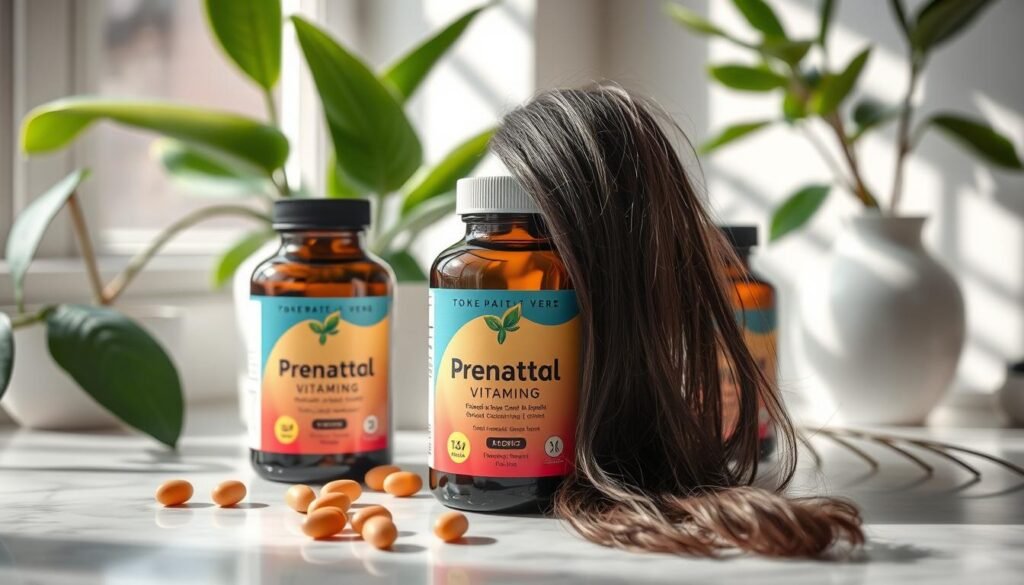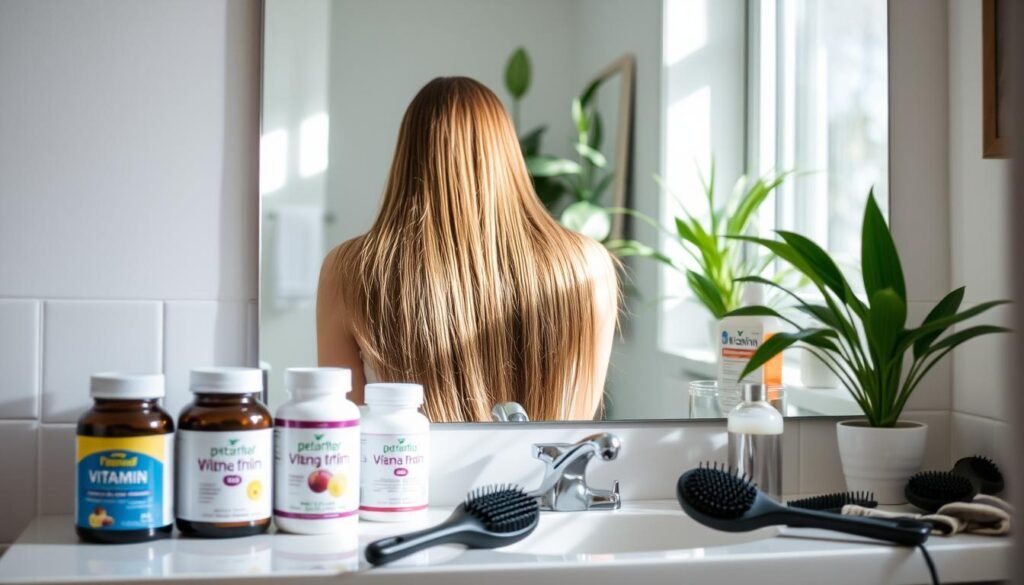About 30% of women deal with hair loss at some stage in their lives. This leads many to search for answers and possible treatments. The idea of using prenatal vitamins for hair growth has caught on. Although these vitamins are made for pregnancy health, people are asking: “can I take prenatal vitamins for hair loss?” Important nutrients in these vitamins, like folic acid and iron, may help hair grow. Yet, it’s crucial to know what these vitamins really do and their connection to hair health. Given the growing interest, it’s valuable to discuss the good and bad of prenatal vitamins for hair. We’ll also look at the best ones for hair loss in stores. Learn more about the nutrients in prenatal vitamins and how they might benefit your hair.
Key Takeaways
- Many women notice better hair growth during pregnancy, probably thanks to prenatal vitamins.
- Folic acid and iron in these vitamins are key for healthy hair.
- It’s important to talk with a doctor before taking any vitamins.
- Taking too many prenatal vitamins when not needed can be harmful.
- Studies on prenatal vitamins for hair growth specifically are still few.
The Link Between Hair Loss and Nutritional Deficiencies
Studying how lack of nutrition leads to hair loss gives important tips for keeping hair healthy. Research shows that people with thinning hair often lack important vitamins and minerals. These include Vitamin D, B12, and others, which are less in those with hair loss issues than in people with healthy hair.
Understanding Common Nutritional Deficiencies
Many nutritional shortcomings can harm hair health. The most observed deficiencies are:
- Vitamin D: Causes dry, brittle hair and lots of shedding.
- Vitamin B12: Harms hair follicle performance and hair strength.
- Iron: More common in women, linked to severe hair loss.
- Folic Acid: Slows down hair growth by affecting cell division.
- Vitamin A: Needed for scalp moisture through sebum production.
- Zinc: Plays a critical role in hair health maintenance.
How Nutritional Deficiencies Can Affect Hair Health
Lacking nutrients can change how hair grows, often leading to hair loss. For instance:
- Low Vitamin D is related to alopecia types. Studies show supplements might improve hair thickness.
- Not enough Vitamin C leads to more hair falling out. It’s important for strong hair roots.
- Lacking B vitamins, like biotin, can make hair thin and weak.
This connection highlights the role of prenatal vitamins for hair regrowth. They offer vital nutrients that could prevent deficiencies, making people wonder, are prenatal vitamins good for hair loss? Clearly, getting the right nutrients is key to having healthy hair.
What Are Prenatal Vitamins?
Prenatal vitamins are special supplements for mom and baby during pregnancy. They have key nutrients for fetal growth and mom’s health. People also use them for hair loss, especially when hair is getting thinner.
Essential Nutrients Found in Prenatal Vitamins
Key nutrients in these vitamins are:
- Folic Acid
- Iron
- Vitamin D
- Vitamin C
- Zinc
- Biotin
Getting the right balance of vitamins is crucial. Not having enough of these can cause health problems, like hair falling out. For instance, not having enough iron affects your hair’s health and growth.
The Importance of Folic Acid and Iron
Folic acid is vital for the baby’s brain development and for good health. Iron prevents anemia by making sure you have enough blood for both of you. Not getting enough can lead to hair loss. That’s why prenatal vitamins are helpful. They prevent the nutrient shortage that makes hair weak, especially during and after pregnancy.
Managing the side effects of prenatal vitamins might mean changing what you eat. This helps moms get what they need without feeling sick.
Can Prenatal Vitamins Help With Hair Loss?
Many people wonder about using prenatal vitamins for hair loss. They often ask: can I take prenatal vitamins for hair loss? These supplements have nutrients that might improve hair health.
Prenatal vitamins have folic acid, iron, and biotin. These nutrients are key for hair growth. Folic acid helps keep hair follicles healthy. Without enough, hair might fall out or grow slowly. Around 20% of pregnant women lack enough iron, leading to hair loss.
Biotin makes hair flexible and prevents it from breaking. Studies show it helps most people dealing with hair loss. Vitamin C helps make collagen, strengthening hair by 30%. Omega-3s keep the scalp healthy, boosting hair growth by 25%. Pregnant women could see better hair in 4 to 12 weeks of taking these vitamins.
| Nutrient | Role in Hair Health | Prenatal Vitamin Content |
|---|---|---|
| Folic Acid | Supports follicle health; prevents deficiency-related hair loss. | 400-800 mcg |
| Iron | Prevents hair loss linked to deficiency. | Varies by brand |
| Biotin | Improves elasticity; reduces breakage. | Varies by brand |
| Vitamin C | Creates collagen; protects against oxidative stress. | Varies by brand |
| Omega-3 Fatty Acids | Promotes scalp health and reduces inflammation. | Varies by brand |
While there are many positive stories about prenatal vitamins for hair loss, solid scientific proof is rare. Most benefits might come from fixing nutrient shortages, not just the vitamins. People should look at both user stories and prenatal vitamins for hair loss reviews before deciding.
The Role of Hormones in Hair Growth During Pregnancy
The hormonal changes during pregnancy greatly impact hair growth. The rise in hormones like estrogen and progesterone leads to fuller hair. Understanding these hormonal shifts is key to knowing about prenatal hair health and postpartum changes.
How Estrogen Affects Hair Growth
During pregnancy, higher estrogen levels make the hair growth phase last longer. This results in thicker and healthier hair. Increased blood flow and more oil production also play a role. While prenatal vitamins help, the main reason for hair regrowth is hormonal changes.
Understanding Postpartum Hair Loss
After giving birth, hormone levels drop, leading to postpartum hair loss. Many women see their hair shed as their bodies return to pre-pregnancy hormone levels. Although taking prenatal vitamins and supplements is common, genetics are mostly to blame for hair loss, not lack of nutrients.

| Hormone | Effect During Pregnancy | Impact Postpartum |
|---|---|---|
| Estrogen | Encourages longer hair growth phase | Drop in levels leads to hair shedding |
| Progesterone | Enhances scalp nourishment | Levels decrease, affecting scalp health |
The complexities of hair growth during and after pregnancy show that prenatal vitamins have a limited role. For lasting benefits, focusing on genetics and overall well-being is crucial. Understanding these aspects helps in managing expectations about hair growth cycles and hormonal changes.
Expert Opinions on Using Prenatal Vitamins for Hair Growth
Prenatal vitamins are packed with nutrients important for hair health, but experts aren’t fully convinced they boost hair growth. They believe there’s not enough proof linking prenatal vitamins directly to hair improvement.
Research on Prenatal Vitamins and Hair Growth
Research shows some vitamins in prenatal supplements, like biotin and Vitamin D, might help hair. Biotin could make hair stronger and thicker, yet there’s no definitive proof. Vitamin D is essential for hair follicles, and some studies suggest it might improve hair growth.
Pregnancy increases blood flow, which might help deliver more nutrients to the scalp. This could encourage hair to grow.
Medical Opinions on the Use of Prenatal Vitamins for Hair Health
Doctors say prenatal vitamins have crucial nutrients such as folic acid and iron, mainly for pregnant women. Others might not need these high levels. They recommend eating well instead of taking supplements.
It’s important to talk to your doctor about hair health and nutrition. This helps avoid the dangers of too much iron.
| Nutrient | Benefits for Hair | Recommended Intake |
|---|---|---|
| Folic Acid | Supports cell growth; improves hair strength | 600 micrograms daily for pregnant women |
| Iron | Essential for hemoglobin; promotes oxygen delivery to scalp | 27 milligrams daily for pregnant women |
| Biotin | May enhance hair appearance; strengthens strands | 30 micrograms daily recommended |
| Vitamin D | Promotes healthy hair follicle maintenance | 600 to 800 IU daily |
Risks of Taking Prenatal Vitamins without Pregnancy
Prenatal vitamins might seem good for hair loss, but they come with potential risks. These risks are especially true if you’re not pregnant. The vitamins have iron and folic acid, which can be harmful in high doses.
Potential Side Effects of Excessive Nutrients
Taking too many prenatal vitamins can cause side effects. Some people might have:
- Gastrointestinal discomfort like constipation, nausea, and stomach pain from too much iron.
- Fatigue and brain issues because excess folic acid hides vitamin B12 deficiency signs.
- Thyroid problems from a lot of iodine, causing thyroid swelling or stomach upset.
Nonpregnant women need 18 mg of iron, and men need 8 mg. Prenatal vitamins usually have more, which can be too much. Also, these vitamins may not help with hair loss as some people expect.
Consulting Healthcare Providers Before Use
It’s smart to talk to a doctor before taking prenatal vitamins. A lot of pregnancies in the U.S. aren’t planned. So, many women take these vitamins for hair without knowing better options exist.
Doctors can find out what nutrients you really need. This avoids the risks of taking vitamins without needing them. It’s key to find the right nutrition balance through diet and safe supplements.

Alternatives to Prenatal Vitamins for Hair Health
There are many ways to boost your hair health without prenatal vitamins. By focusing on key nutrients, you can find great alternatives. These play important roles in making your hair grow and keeping you healthy.
Effective Nutrients for Hair Growth
Some nutrients are especially good for hair growth:
- Biotin: Even though few healthy people lack enough biotin, experts often suggest taking up to 5,000 mcg for hair loss. Most folks only need about 30 mcg a day.
- Vitamin D: In places like the Northeast US, lack of sunlight can mean not enough vitamin D. Taking 2,000-5,000 IU daily can help.
- Iron: Low iron is a common problem, especially for women. It’s vital to get enough for your hair’s health.
- Zinc: Important for hair, lacking zinc can cause hair loss, a big issue during pregnancy.
- Vitamin C: It helps your body use iron better and can reduce hair loss from low iron.
Dietary Changes to Support Hair Health
Changing what you eat can really help your hair. Eating right, with lots of the nutrients we talked about, helps your hair grow and prevents it from falling out:
- Try to eat lots of fruits and veggies, especially those with a lot of vitamin C.
- Eat fatty fish, nuts, and seeds for omega-3 fats that are good for you.
- Choose lean proteins, like chicken and beans, for strong hair.
- Add dairy or dairy substitutes to get more calcium and vitamin D.
- Go for nuts and seeds because they’re full of zinc.
These diet changes not only boost hair growth but also promote healthy living. For a deeper dive into vitamins and supplements for hair, here’s a great resource to check out.
Reviews on Prenatal Vitamins for Hair Loss
The effectiveness of prenatal vitamins in promoting hair health has garnered significant attention. Many individuals share their user experiences with prenatal vitamins, reporting varying outcomes regarding hair growth and loss. These vitamins are designed primarily for pregnant women and contain essential nutrients.
Some believe these vitamins can also help with hair thinning.
User Experiences with Prenatal Vitamins
Reviews show mixed results from those using prenatal vitamins for hair loss issues. Some women have seen improvements in hair thickness and health. Vitamins rich in biotin, vitamin D, and iron often get good feedback in prenatal vitamins for hair loss reviews.
A number of individuals have seen positive changes. They attribute their improved hair conditions to these vitamins. They report feeling more confident with less hair fall and more volume.
Comparing Different Brands of Prenatal Vitamins
There are many brands of prenatal vitamins available, each with its own formula. Below is a summary of a few popular brands:
| Brand | Formulation | Price | Key Ingredients |
|---|---|---|---|
| Prenatal Daily Packets | Daily packets | $66 | Folic Acid, Iron, DHA |
| Prenatal Gummies | Gummy form | $39 | Biotin, Vitamin D |
| Magnesium Plus | Supplement | $35 | Magnesium, Zinc |
Each brand offers distinct benefits and formulations that cater to individual needs. For those experiencing hair loss, it’s important to know which nutrients help with hair health. For more detailed insights, readers can explore additional resources like vitamins and minerals in hair health.

Best Practices for Hair Care While Considering Supplements
Getting amazing hair goes beyond just vitamins. Good hair care involves regular habits, eating right, and being gentle with your hair. When you mix this with things like prenatal vitamins or hair growth supplements, you might see even better results.
Healthy Hair Care Routines
Starting good hair care habits is super important. Make sure you treat your hair nicely to avoid damage. Here’s what you should do:
- Reduce heat styling tools, as excessive heat can weaken hair strands.
- Avoid aggressive chemical treatments that may lead to brittleness.
- Wash hair with sulfate-free shampoos to maintain moisture balance.
- Incorporate deep conditioning treatments to nourish and hydrate hair.
- Limit the number of washes per week to prevent stripping natural oils.
The Importance of Balanced Nutrition
Eating well is key for strong, healthy hair. A diet full of vitamins and minerals supports hair growth. Make sure you eat these:
- Lean proteins, which are the building blocks of hair.
- Fruits and vegetables, loaded with antioxidants and essential vitamins.
- Healthy fats from sources like avocados and nuts for scalp health.
- Whole grains, providing energy and vital B vitamins.
- Hydration, ensuring that hair and scalp remain well-moistened.
By sticking to these top hair care tips and eating right, you set up a strong base. This means you can get the most out of any supplements you take. All so your hair can be as healthy as it can be.
Conclusion
Some people ask, “can I take prenatal vitamins for hair loss?” It’s key to think about this carefully. Prenatal vitamins have important nutrients like folic acid, iron, and B vitamins. These are great for your hair. But, no big studies show they make hair grow for those not pregnant or trying to get pregnant.
During pregnancy, some see better hair growth. This might be from fixing nutrient shortages, not just the vitamins. Bodies change a lot when you’re pregnant, leading to healthier hair sometimes. But, shedding hair after giving birth is normal. It usually gets better on its own.
Talking to a healthcare provider before trying supplements is smart. Prenatal vitamins are good for pregnancy health. But, if you’re not planning a pregnancy, other options might work better for hair care. Eating right for your own health needs helps your hair the most.